Since you recorded that episode who knows how many months ago, chances are you’ve already heard this from somewhere, but I figured I might as well share a tidbit about Japanese pronunciation. You were wondering about what’s the difference between Sakutarou and Sakutaro, as you said both of them the same way. As Japanese writing is phonetic (well, hiragana and katakana are, dunno if kanji count, strictly speaking), exactly what sounds are related to what letters is far more strictly defined than in, say, English, where the letter “o” can correspond to a couple of different sounds.
In Japanese, what is written as ‘o’ in the roman alphabet is a short sound similar to how you’d say ‘o’ in some English words that begin with 'o, like the words “otter” or “objection!”. The Japanese ‘ou’, on the other hand, corresponds to how English uses ‘o’ in certain other contexts, like in other words that begin with ‘o’ such as “old” or “over”, or how you’d usually say it when a word ends in ‘o’.
So, basically ‘o’ alone in Japanese is short and sharp whereas ‘ou’ is longer and tends towards an ‘u’ sound at the end. However, since both of those distinct sounds are represented by a single ‘o’ in written English, using those properly in Japanese can be a bit difficult for native English speakers. What muddies the waters further is that when Japanese words or names are written in roman letters for English speakers, sometimes when there’s an ‘ou’ -sound, it’s written only as ‘o’ because English speakers are expected to say the single ‘o’ as ‘ou’ anyway. For example, Tokyo is not written Toukyou, even though that might technically be a more accurate transliteration. This makes the words look neater, but makes things a bit confusing when the ‘o’ really is supposed to just be an ‘o’ and not an ‘ou’.
So, the way you say “Sakutaro” is actually pretty much how one should say “Sakutarou”, but since English almost always uses the ‘ou’ pronunciation for words ending in ‘o’, this little error is pretty much omnipresent in English speakers who haven’t studied Japanese, and it isn’t really anything to be ashamed of.
In other news, I recall that after I had first read Umineko and some time had passed, I started regarding Ange’s story as a bit of a weird sidestep - something that provided useful information and all and touched on interesting themes, but overall felt tangential to the ‘real’ story. Now that I get to re-experience it through your wonderful playthrough, I feel like appreciating it a lot more. Having an understanding of the workings of Umineko gives me the opportunity to focus on and understand Ange as a character more than on my first read. What previously felt like a strange sidestory is now a story that has great emotional weight on its own, a story that is definitely worth telling. Ange’s story might be the part of Umineko that benefits the most from a reread, at least to me.
Looking forward to seeing you continue to challenge Episode 4 and slowly be driven insane by Sakutaro’s voice.
![]()













